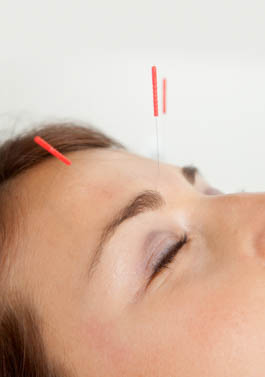Researchers document that acupuncture and herbs are effective in the relief of insomnia. In a recent finding, investigators have discovered that combining acupuncture and herbs into a comprehensive treatment regimen greatly enhances the total effective rate. Yin Tang and other face acupoints on a woman with red handle needle. The controlled clinical experiment investigated three separate groups. An acupuncture group, an herbal medicine group, and a combination group receiving both acupuncture and herbs were compared.
Acupuncture was administered at a rate of one treatment every three days with a total of four acupuncture sessions per course of care. Two courses of care were administered with an interval of three days for all groups. Before and after treatment, the Pittsburgh Sleep Quality Index (PSQI) was used to analyze the data. The acupuncture group received treatment at the following acupuncture points:
Sishencong
Yintang
Anmian
Taiyang
The herbal medicine group received the Traditional Chinese Medicine (TCM) modified formula Ningxin Anshen. The primary ingredients of the formula are:
Huang Lian
Hu Po
Shi Chang Pu
Yuan Zhi
Fu Ling
Dan Shen
Gan Cao
Hong Zao
Fu Xiao Mai
Ci Shi
Zhen Zhu Mu
According to TCM principles, this herbal formula has sedative properties. TCM theory states that it calms the shen, the spirit, and has a tranquilizing effect. The formula is also noted for promoting blood circulation, benefitting the liver, reducing dizziness, and benefitting patients with a deficiency constitution marked by a weak pulse. Indications for use of this formula include insomnia, irritability, hot flashes, palpitations, redness of the cheeks, menopausal symptoms with heat, neurasthenia, persistent thirst, depression, and discomfort of the heart and chest region.

According to TCM theory, this herbal formula benefits patients with insomnia due to yin deficiency with uprising fire. Sterile disposable needles in packs. Patients consumed the herbal formula once per day. The combination group received the identical acupuncture and herbal medicine regimen given to the aforementioned groups.
Research Methodology
A stringent selection standard was used to select the study participants. Inclusion and exclusion criteria were extensive including the following:
Patients must have fulfilled the diagnosis standard of insomnia.
All patients had not previously participated in this type of investigation.
All patients were between 18 - 75 years old.
All patients had a PSQI score above 7.
Patients had not taken insomnia medication within two weeks from the beginning of the investigation.
Results were statistically analysed using a rank-sum test and variance analysis (P < 0.05) based on the PSQI score. The results were surprising. The total effective rate for the combination group was 100% for the treatment of insomnia. This includes patients ranging from mild improvement to completely cured. Parameters of effectiveness included time to fall asleep, total sleep time, sleep efficiency, temporary sleep baffle, and daytime function. In short, the PSQI score of the combination group was better than the TCM herbal medicine group and the acupuncture group.
For the combination group, a 100% effective rate was achieved. All patients reported that the treatment was effective and helped to improve their insomnia. In comparison, the TCM herbal medicine group reported a 97.67% effective rate and the acupuncture group reported a 73.33% effective rate. Acupuncture and herbal medicine were found effective for the treatment of insomnia, however, the combination of the two modalities produced significantly superior patient outcomes.
References:
Cao Jia, Lu Lili, Xu Lei. Cognitive Behavioral Therapy and Its Impact on Sleep Quality in Elderly Patients with Coronary Artery Disease [J]. Hebei Medical, 2014, 11(2): 1916 – 1919.
Li Wanting. Radix Bupleuri, Pig Keel and Clam Soup Combined with Acupuncture to Treat Insomnia Due to Qi Stagnation for 64 Cases [J]. Shanxi Medical Journal, 2014, 43(20): 2434-2435.
Sun Yunfeng, Ying Yin, Xia Zhongni. Meta-Analysis on the Efficacy and safety of Paliperidone and risperidone in curing Schizophrenia [J]. Chinese Journal of Modern Applied Pharmacy, 2014, 10(1): 1263 – 1267.

![Diseases, Symptoms, tcm, [tcmwindow.com]](/uploadFile/adImg/2015/11/11/f5cbfcc0-4df5-4646-9b9a-f316651a0199.jpg)





